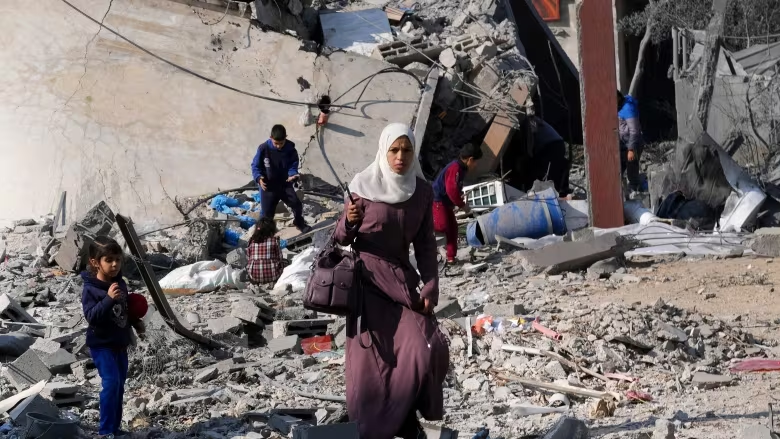
Palestinians pass by the remains of a Hamad family building demolished in an Israeli attack in Deir al-Balah, Gaza Strip, on Friday. (Photograph by Adel Hana/The Associated Press)
In a significant development, South Africa launched a case on Friday at the United Nations' top court, accusing Israel of committing genocide against Palestinians in Gaza. The country has submitted its claims to the International Court of Justice, asserting that Israel's actions, both in terms of acts and omissions, have a genocidal character. The accusation contends that Israel aims to destroy Palestinians in Gaza, constituting a broader assault on the Palestinian national, racial, and ethnic group.
South Africa, a vocal critic of Israel's military campaign in Gaza, drew parallels between Israel's policies and South Africa's historical apartheid regime. President Cyril Ramaphosa and others have pointedly criticized Israel's actions in the Gaza Strip and the West Bank.
The crux of South Africa's submission is a plea to the Hague-based court for an interim order, urging Israel to immediately suspend its military operations in Gaza. A hearing on this request is anticipated in the coming days or weeks. Although the legal process could span years if the case proceeds, an interim order might be issued much sooner.
In response, Israel promptly rejected the accusations with strong disapproval, denouncing the filing as a "blood libel." The Israeli government argued that the case lacks legal foundation and represents a "vile exploitation and cheapening" of the court. Additionally, Israel accused South Africa of cooperating with Hamas, the militant group responsible for a cross-border attack on October 7 that triggered the ongoing conflict.
Israel emphasized its commitment to operating within the bounds of international law and asserted that its military actions are solely targeted at Hamas, with Gaza residents not considered enemies. Israel claims to take measures to minimize harm to civilians and facilitate the entry of humanitarian aid into the territory.
The initial Hamas attack on October 7 resulted in around 1,200 casualties, including several Canadians, according to Israeli tallies. The latest update from Gaza's Hamas-run health authorities reported 187 additional Palestinian deaths in the past 24 hours, bringing the death toll to 21,507 since the start of hostilities.
South Africa is basing its case on the Genocide Convention, as both South Africa and Israel are signatories to the treaty. Whether the case will effectively halt the conflict remains uncertain, given the historical variability in compliance with the International Court of Justice's legally binding orders.
South Africa's Foreign Ministry expressed grave concern over the plight of civilians in Gaza, citing indiscriminate use of force and forcible removal of inhabitants. The ministry highlighted ongoing reports of international crimes, including crimes against humanity and war crimes, and raised the possibility of acts meeting the threshold of genocide as defined in the 1948 Convention on the Prevention and Punishment of Genocide.
South Africa's president previously accused Israel of war crimes and acts tantamount to genocide. Last month, South Africa advocated for the International Criminal Court to investigate Israel's actions in Gaza. Human Rights Watch sees South Africa's case as an opportunity for the International Court of Justice to scrutinize Israel's actions using the Genocide Convention, emphasizing the importance of impartial justice at both the ICJ and the ICC.















